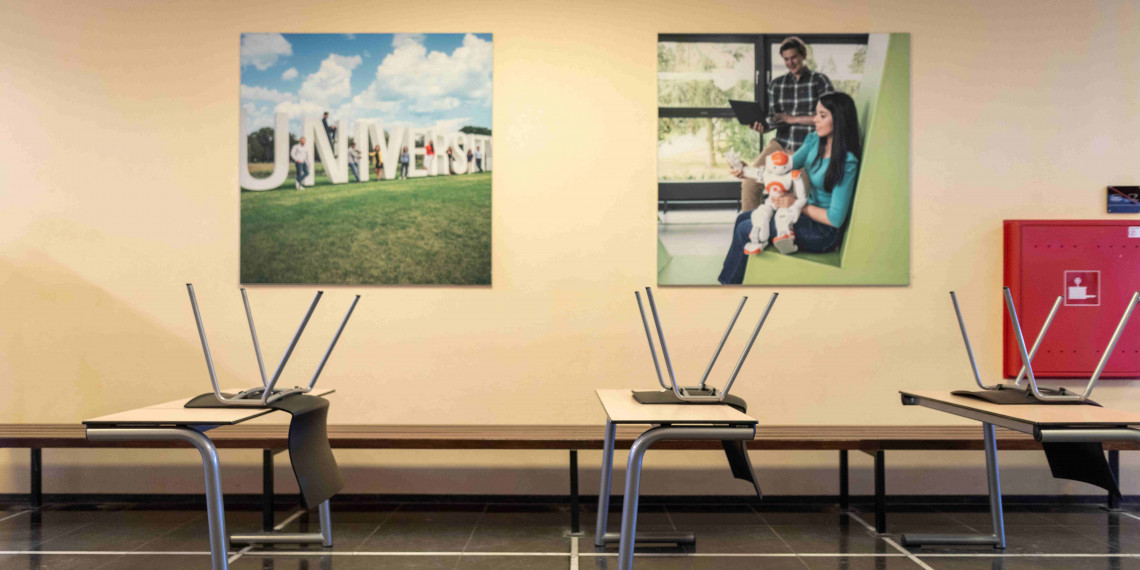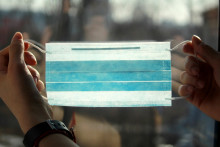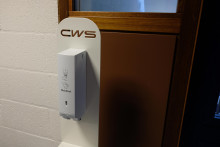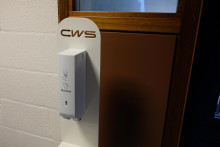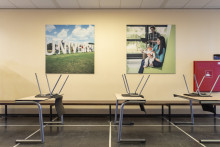It is Thursday afternoon, March 12th, as Applied Physics programme director Stefan Kooij welcomes an audience of hundreds of prospective students on campus. About two hundred kilometers away, at exactly the same time, Prime Minister Mark Rutte, former Minister Bruno Bruins and Jaap van Dissel of the RIVM are giving a press conference. 'Gatherings of more than 100 people will be cancelled throughout the Netherlands', is the urgent message from The Hague. These words hit Enschede hard. All visitors to the Master's Open Day are to return home immediately.
In retrospect, Rector Thom Palstra said he was facing his biggest dilemma in times of crisis when the open days had to be cancelled. After all, everything went perfectly according to government protocols up to that point. In fact, a month and a half earlier, a handful of UT students in China were the biggest concern. However, the virus soon continues to spread from the Chinese city of Wuhan. Since the end of February – around the time of the first Dutch corona infection – a UT crisis team has been preparing 'calmly and carefully' for what is to come. At that time, the Netherlands is still very much at slumber; the extent and the danger of the virus have not yet fully manifested itself. But as of 12 March things start to get serious.
Shoulders to the wheel
The Executive Board decides to shut down UT education for one week. A few days later, universities and universities of applied sciences (hbo) close their doors collectively until 6 April - and that's just the beginning, as it turned out later. The UT asks its staff and students abroad to return home. Working from home and studying at home becomes the 'new normal'. Within a week, the university switches to fully online education. From now on, we talk to each other via Teams, Skype, BlueJeans or Zoom, albeit in the latter case, experts warned of safety risks, after which the university banned Zoom.
In the first weeks of the crisis, the UT community puts its shoulders to the wheel. Within a few days several initiatives emerge. For corona-related research, the UT laboratories soon reopen; the TechMed Centre supplies 25 boxes of mouthpieces, gloves, protective suits and disinfectants to the Medisch Spectrum Twente (MST) hospital and later on, the institute plays an important role in the development of alternative ventilators, as a shortage is imminent due to the large number of patients at the intensive care units in the Netherlands. The student community is also making the best of it in this early stage of the crisis. Taste organises a digital cantus and the Batavierenrace ‘continues’ as planned, be it in a digital version.
Scratches and dents
Despite the ‘new normal-optimism’, not all of things are going according to plan. The UT does not immediately opt for the controversial proctoring software when taking exams, but asks students to sign an ‘integrity statement'. This – and other anti-fraud incentives – does not prevent students in the Technical Computer Science programme from breaking the rules. Subsequently, 280 students see their results cancelled due to fraud.
There are more things that take an unpleasant turn. The virus persists and this forces Mark Rutte to ban all licensed events until the 1st of September. Meaning: no GNSK, no summer school and no tens of thousands of kiddo's on campus during the Kick-In. Furthermore, most student teams see how the events in which they are supposed to participate are cancelled or postponed.
Bright spots
The thin veneer of optimism holds up better for some members of the UT community than for others. For example, the Kick-In committee is focusing on a mainly online alternative for the introduction period, a group of employees are starting an online talk show and some students see the situation as an opportunity for introspection and relaxation. Further deregulations from May also offer the possibility of reopening laboratories and sports facilities. ‘On campus, if possible. Online, because it is possible’, becomes the new slogan of the Association of Universities in the Netherlands (VSNU).
There are also small encouragements. This year, students will not have to deal with the binding study advice (bsa) and the 'harde knip'. Moreover, they can use their public transport card three months longer and there is support for students from outside the EU. Nonetheless, it is becoming increasingly clear what kind of toll the crisis is taking. The UT community misses the campus, their colleagues and fellow students, the interaction. Online education is also proving to be a burdensome task for lecturers. 'We do what we can, dear students, not what we want', as columnist Femke Nijboer writes.
Critical remarks
These negative consequences of the corona crisis on higher education do not remain anecdotal, but are also quantified. More loneliness, more boredom, less contact with fellow students and problems with concentration, motivation and structure: these are the results of a survey that study association Sirius conducted among its members. Research by U-Today also shows that half of the students and a quarter of the staff at the UT experience 'a lot of burden' as a result of the corona crisis. Later research by P-Nut, the PhD network of the UT, provides a similar or even more negative impression of the consequences for PhDs.
The call for further relaxation at the UT grows in June, when figures show that the first corona wave has passed. Why are people allowed to go to the gym and to bars again, but not to their place of work at the university? Why is there no confidence in the self-reliance of employees? Despite the criticism, the Executive Board and crisis team continue to manoeuvre cautiously. It is only in the new academic year, starting on the first of September, that the university will ease its measures further. By then, staff and students will once again be allowed to use 40 percent of the campus facilities. Evening lectures will also be introduced to spread the crowds, a novelty in the history of the university, like so many measures in this crisis.
That caution is still a must is shown this summer by six corona cases in 'Campus053', the part of the Hogekamp where Camelot rents 450 student apartments. The six infected residents, who found out when they wanted to return to their homeland and had themselves tested, went into self-quarantine for two weeks. Research by the GGD shows that no other residents have been infected.
One-and-a-half meter university
The 'mini outbreak' on campus shows that we are far from getting rid of the coronavirus. The increasing number of infections in the Netherlands also makes us fear for a second wave. How does the UT deal with this? The first step seems to be to set up an ‘one-and-a-half meter university’. We will see what it will look like in reality from September onwards. It is certain that it will be tailor-made within the one and a half square kilometres of the campus. Lectures, practicums and exams will be given priority over other educational activities, so much is certain.
The new first-year students are also given priority; after all, they still have to get to know the UT. At the same time it is now painfully clear that the government can pull the reins again, in which case a false start threatens the new generation of students. How cheerful or gloomy the music of the future will sound, we can only await. If there is one thing this crisis shows, it is that today's answers may be question marks of tomorrow. President Victor van der Chijs already said the following about the crisis at the beginning of April: 'As a university we need to be agile. Managing the UT used to be delightfully predictable now and then. That has changed completely.’


